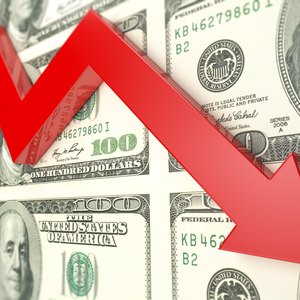
Suppose you've been planning and saving and faithfully putting your funds into retirement plans in the expectation of retiring in a few years. But now you're faced with the possibility of going through a recession.
What effect will an economic downturn and a recession have on your retirement plan? Will you have enough funds and still be able to retire when you want?
Here are the issues you need to consider and some steps you can take to avoid a financial crisis and weather the storm.
1. Decline in Stock Market
A decline in your investments in your 401(k) and your IRAs can be a scary thing. You've worked hard to save your money, and it can disappear in just a few days or weeks when the market drops. Fortunately, stock markets usually absorb the loss and recover, although it may take a few years.
Let's take a look at the last two recessions and the performance of the Standard & Poor's 500. During the 2001 recession, which lasted eight months, the S&P 500 reached a high of 2,042 in April 2001, and it declined to a low of 1,687 in September. By December 2001, the S&P 500 had climbed back to 1,878.
The S&P 500 at the beginning of the Great Recession, which lasted 18 months, in December 2007 was at 2,020. It declined to a low of 1,001 in February of 2009. Although it took several years, the S&P 500 did recover to 2,024 by May 2013.
The point is that although the stock markets will decline during recessions, they will always recover, even though it may take a few years..
So don’t panic. Instead, keep investing and buy stocks or market index funds at bargain prices when they drop during a recession. This gives you the advantage of being able to average down your costs and make a profit when the market rebounds, which it will.
Make sure your investment portfolio is balanced between stocks and bonds. As you get older and closer to retirement age, you'll want to look at your asset allocation and have more of your retirement funds in fixed-income securities, such as bonds and certificates of deposit, rather than taking the risks of fluctuations in the stock market.
Although interest rates on savings accounts are low now, the Federal Reserve Bank is expected to raise the federal funds rate to combat the sharp increase in inflation. This will raise the rates that savers will receive on their savings accounts and certificates.
You may even want to think about your investment strategy and consider moving some of your retirement funds into annuities that will provide you with additional income in retirement.
If you're planning to retire in the near future, a recession could force you to revise your plans, but there are steps you can take to reduce the damage.
2. Decline in Home Values
For many people, the expectation of rising home prices and the buildup of equity in their homes is intended to become a major source for retirement funds. Although home prices have been on the rise recently, a recession could put a damper on this financial planning strategy and actually result in a decline in home values.
How much this will affect your retirement plan depends on when you want to retire and if you plan on selling your house and moving to another part of the country. If that is the case, you may have to revise your strategy.
If your existing mortgage is paid off, and you were planning on using the proceeds from the sale of your house to purchase another home, a decline in your home’s value may force you to purchase a smaller house or choose another region with a lower cost of living.
3. Stagnant Wages or Job Loss
If your income becomes stagnant or if you lose your job, you may not be able to contribute as much to your retirement accounts. This means you may have to work longer to achieve or revise your retirement funds goal.
This will force you to delay the age you intended to retire. If you're not able to reach your retirement goal by the age you want, you may have to consider working longer or taking on a part-time job in retirement.
In an ironic twist, the trend in the labor market toward more remote working jobs as a result of the coronavirus pandemic has created more part-time opportunities for retirees to work from home. Older workers now have more opportunities of finding new jobs and other ways to supplement their income in retirement.
4. Change in Expected Retirement Lifestyle
If your retirement nest egg has declined, you may have to revise your budget for retirement.
The general rule of thumb is that you can expect your retirement funds to last for 30 years if you withdraw at the rate of 4 percent per year. In other words, if you have retirement assets of $1 million, you can withdraw $40,000 per year to support your lifestyle in retirement. But will that be enough?
What if you aren't able to reach that $1 million level? Suppose you only have $800,000 in your retirement funds. Applying the 4 percent rule means that you would only be able to withdraw $32,000 per year for your retirement income. Will that be enough or will you have to revise and lower your expectations? And don’t forget to consider the additional costs of health care that you may incur as you get older. Medicare doesn’t completely cover all costs of health care, and you might want to add a Medicare supplement policy.
Of course, not all retirement income has to come from your investments. You may have some defined benefit plans, such as pensions, that will provide you with a fixed income and retirement. Defined-benefit plans are different from defined-contribution plans that both you and your employer may contribute funds to.
You may have to consider working longer or getting part-time employment to supplement your income to support your lifestyle expectations in retirement.
5. Start Drawing Social Security Earlier
If you're not already aware, you will receive a higher monthly benefit from Social Security for the rest of your life the longer you wait to begin the withdrawals. You can start as early as age 62, but your monthly benefit will be higher if you wait until you're at least 70. However, losing your job may force you to consider taking your Social Security benefits sooner, rather than later.
On the other hand, depending on your financial situation, if you're able to delay withdrawing your Social Security benefits, the higher monthly checks will give you more financial security, particularly if your retirement savings aren’t large enough to completely support the income needed for your retirement lifestyle.
When you're going into a recession and considering retirement, you will need to explore the possibility of creating multiple sources of income. These could include Social Security benefits, pensions and part-time work, in addition to waiting a few years later to retire.
References
Writer Bio
James Woodruff has been a management consultant to more than 1,000 small businesses. As a senior management consultant and owner, he used his technical expertise to conduct an analysis of a company's operational, financial and business management issues. James has been writing business and finance related topics for work.chron, bizfluent.com, smallbusiness.chron.com and e-commerce websites since 2007. He graduated from Georgia Tech with a Bachelor of Mechanical Engineering and received an MBA from Columbia University.

